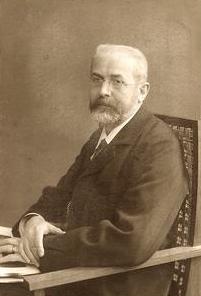Ferdinand Georg Frobenius facts for kids
Quick facts for kids
Ferdinand Georg Frobenius
|
|
|---|---|

Ferdinand Georg Frobenius
|
|
| Born | 26 October 1849 Charlottenburg, Berlin
|
| Died | 3 August 1917 (aged 67) |
| Nationality | German |
| Alma mater | University of Göttingen University of Berlin |
| Known for | Differential equations Group theory Cayley–Hamilton theorem Frobenius method Frobenius matrix Frobenius inner product |
| Scientific career | |
| Fields | Mathematics |
| Institutions | University of Berlin ETH Zurich |
| Doctoral advisor | Karl Weierstrass Ernst Kummer |
| Doctoral students | Richard Fuchs Edmund Landau Issai Schur Konrad Knopp Walter Schnee |
Ferdinand Georg Frobenius (born October 26, 1849 – died August 3, 1917) was a German mathematician. He is best known for his important work in areas like elliptic functions, differential equations, number theory, and especially group theory. He also helped develop the idea of rational approximations for functions. He was the first to fully prove the Cayley–Hamilton theorem, which is a key idea in linear algebra.
Contents
About Ferdinand Georg Frobenius
Ferdinand Georg Frobenius was born on October 26, 1849, in Charlottenburg. This was a suburb of Berlin, Germany. His father, Christian Ferdinand Frobenius, was a Protestant parson.
Early Life and Education
Frobenius started at the Joachimsthal Gymnasium, a high school, when he was almost eleven years old. After graduating in 1867, he went to the University of Göttingen. He studied there for just one semester. Then, he returned to Berlin. In Berlin, he attended lectures by famous mathematicians like Kronecker, Kummer, and Karl Weierstrass.
He earned his doctorate degree in 1870. He received it with special honors. His main supervisor was Karl Weierstrass. His thesis was about solving differential equations.
Career and Return to Berlin
After finishing his studies, Frobenius taught at secondary schools. He taught at the Joachimsthal Gymnasium and then at the Sophienrealschule. In 1874, he became a professor of mathematics at the University of Berlin.
Frobenius stayed in Berlin for only a year. In 1875, he moved to Zürich, Switzerland. He became a full professor at the Eidgenössische Polytechnikum. He worked in Zürich for seventeen years, from 1875 to 1892. During this time, he got married and started his family. He also did a lot of important work in many different areas of mathematics.
In late 1891, Kronecker, one of his former teachers, passed away. This left a teaching position open in Berlin. Weierstrass strongly believed that Frobenius was the best person to keep Berlin at the forefront of mathematics. He used his influence to help Frobenius get the job. In 1893, Frobenius returned to Berlin. He was also elected to the Prussian Academy of Sciences.
Contributions to Group Theory
Group theory became one of Frobenius's main interests later in his career. Group theory is a branch of mathematics that studies abstract algebraic structures called groups. Groups are sets with a special operation that combines any two of its elements to form a third element.
Sylow Theorems
One of his first important contributions was proving the Sylow theorems. These theorems are very important in group theory. Earlier proofs of these theorems only worked for specific types of groups called permutation groups. Frobenius's proof was for more general, abstract groups. His proof of the first Sylow theorem is still used often today.
Group Characters and Representations
Even more important was his creation of the theory of group characters and group representations. These are powerful tools that help mathematicians understand the structure of groups. This work led to new ideas like Frobenius reciprocity. It also led to the definition of what are now called Frobenius groups.
- Frobenius also showed that if a number n divides the size of a finite group G, then the number of solutions to the equation xn = 1 in G is always a multiple of n.
In his first paper about characters in 1896, Frobenius created the character table for a specific group called PSL(2,p). He also made important contributions to understanding the representation theory of the symmetric and alternating groups.
See also
- List of things named after Ferdinand Georg Frobenius
 In Spanish: Ferdinand Georg Frobenius para niños
In Spanish: Ferdinand Georg Frobenius para niños
 | Jackie Robinson |
 | Jack Johnson |
 | Althea Gibson |
 | Arthur Ashe |
 | Muhammad Ali |

